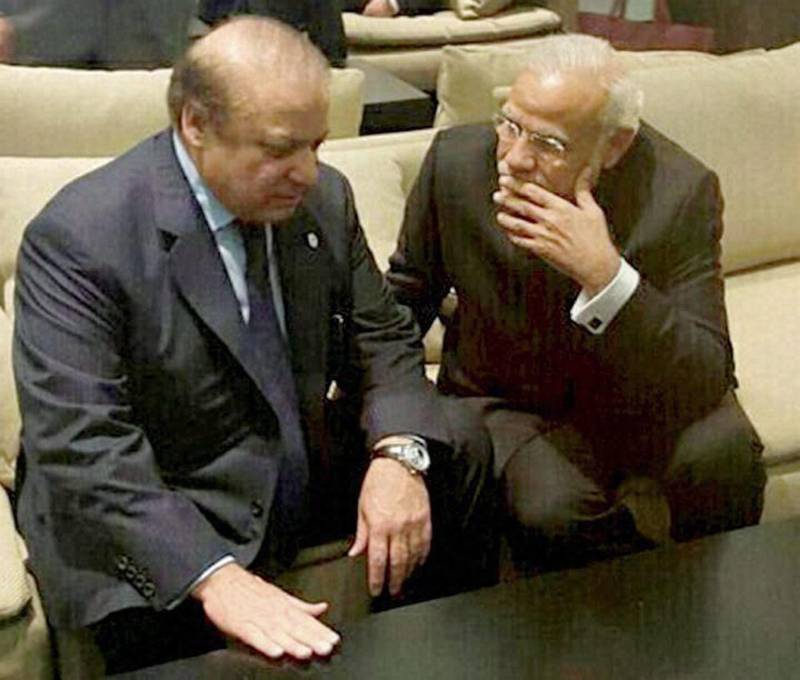Several political analysts have suggested that the BJP-led National Democratic Alliance's (NDA) emphatic triumph in India’s largest populated state, Uttar Pradesh (U.P.) may pave the way for revival of engagement between India and Pakistan. It is being speculated that PM Modi may even meet with his Pakistani counterpart, Nawaz Sharif, on the sidelines of the Shanghai Cooperation Organisation (SCO) meet in June this year.
Those who are predicting the possibility of some sort of thaw point to recent events which include; the house arrest of the arrest of Jamaat-ud-Dawah’s (JuD) chief Hafiz Saeed, on January 30 and the fact that India recently attended the Permanent Indus Commission meeting in Lahore after they announced its suspension after the Uri attacks in September 2016.
However, if these factors would be good enough for these countries to initiate a full-fledged dialogue remains to be seen, as occurrence of such event depends on interplay of many factors.
Firstly, in the past, both the countries have missed the opportunities to capitalize on several attempts been made, both during Congress-led United Progressive Alliance tenure, as also by the current regime under Modi Government. This was primarily because successive governments in Pakistan, including the current one, headed by Nawaz Sharif, have been making the right noises, but have failed to take substantive action against terror groups, such as JuD or Jaish-e-Mohammed (JeM), which have continuously targeted India. A number of senior officials have in fact, repeated defended groups like, JuD.
Secondly, Pakistan’s Prime Minister Sharif’s preparing for elections in 2018 with possibly a modified election manifesto, articulated from emerging regional geopolitical developments, could shape the course of future relationship with India.
Thus, while full-fledged dialogue between India and Pakistan may not be the right answer, recent developments in both the countries could offer a mid-way approach that can be calibrated to steadfast their ties.
In this regard, both the countries should revisit the areas of both convergence and divergence, one at a time, to create an environment for logical dialogue. While the areas of convergence could be capitalized, the same should be used to create an atmosphere to discuss on divergent views as well. One such area for convergence is the progress been made on Turkmenistan-Afghanistan-Pakistan-India (TAPI) gas pipeline.
On March 3, 2017, a long-awaited work on 1,680-km Turkmenistan-Afghanistan-Pakistan-India (TAPI) gas pipeline got under way in Pakistan, with the inaugural of the Front and Engineering Design (FEED) in Pakistan.
TAPI gas pipeline will carry 90 million metric standard cubic meter per day (MMSCMD) of natural gas from the 16 trillion cubic feet (tcf) Galkynysh field (formerly South Yolotan-Osman) for 30 years, with India and Pakistan to receive 44.25 MMSCMD gas each while Afghanistan to get just 1.5 MMSCMD. The gas will flow from Turkmenistan’s Galkynysh fields to Fazilka in India, via, Herat and Kandahar in Afghanistan and Quetta and Multan in Pakistan.
Also, seen as the U.S. New Silk Road Initiative, TAPI gas pipeline could get support from Trump’s Administration as this pipeline could again hard sell as an alternative to Iran-Pakistan-India (IPI) pipeline. Besides, U.S. aggressive promotion of TAPI could also gain traction as an alternative to China’s One Belt One Road initiative. While India awaits Trump’s clear stance on TAPI pipeline, which can be considered as a deciding factor for its successful operation, despite being backed by Taliban, it would be the evolving relationship between India and Pakistan which can seal its fate on the project’s prospects.
Apart from the TAPI project, there are other opportunities such as the ITI-DKD-Y container project comprising of countries like Islamabad, Tehran, Islamabad, Delhi, Kolkata, Dhaka, and Yangon).
This idea was first put forward by United Nations Economic and Social Commission for Asia and the Pacific (UNESCAP), and seeks to extend the Istanbul Tehran Islamabad (ITI) Container Train Corridor to Delhi-Kolkata-Dhaka (DKD). India has expressed keenness in taking this project forward. Only recently, a conference organized by UNESCAP and Indian Railways was held in New Delhi to discuss this project. So far, Pakistan’s response to the project has been tepid and it remains to be seen whether it changes its mind.
Apart from TAPI and the above rail connectivity project, there is also a possibility of the two Punjab’s reviving engagement in areas like culture and sports. Recently elected CM of Punjab, Captain Amarinder Singh had begun this initiative in 2004, and this was taken forward by the SAD-BJP government. Amarinder’s counterpart is Shahbaz Sharif, brother of the Pakistani PM and apart from benefitting both Punjabs, it could also help in lowering tensions between both countries.
In conclusion, it is better for both countries to look at innovative methods for engagement and avoid high profile political engagement. In the past such attempts have failed, while meetings between PMs of both countries have raised immense hopes the bonhomie has not lasted long. A well thought out pragmatic approach rather than a desire to make history may be more advisable.






